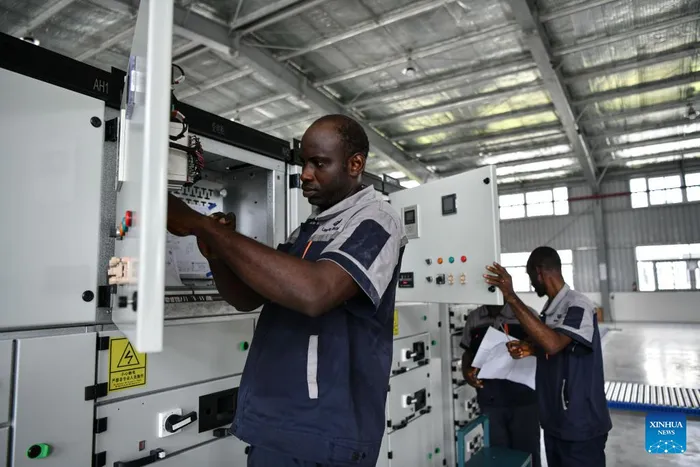Nigeria’s EV bill puts manufacturing at the front

Employees work at a workshop of an electric equipment company in the Lekki Free Trade Zone in Lagos, Nigeria, March 1, 2024. Jointly founded by Chinese companies and the Lagos state government, the Lekki Free Trade Zone started construction in 2006. After 18 years of development, the zone has been gaining momentum in the socio-economic drive of Nigeria, significantly accelerating the process of industrialization and job creation.
Image: XINHUA
Nigeria’s Senate recently advanced the Electric Vehicle Transition and Green Mobility Bill to its second reading. The most transformative element of this legislation is its industrial strategy: it aims not merely to encourage EV uptake, but to compel the establishment of a domestic manufacturing base. The bill, championed by Senator Orji Uzor Kalu, establishes a stringent structure, linking market entry and financial incentives for investors directly to measurable targets for local vehicle assembly, local content use, and production volumes. Successful implementation of this policy could shift Nigeria's role from an importer of electric vehicles to a major assembly hub for the entire African continent.
Turning policy into production
The fundamental principle of Nigeria's new EV bill is rooted in classic industrial policy: it incentivizes local value creation through investment while discouraging business models that view the country purely as an import or export hub. To sell electric vehicles in Nigeria, foreign automakers are now required to form partnerships with Nigerian EV assemblers, establish local assembly facilities within a three-year window, and commit to sourcing a minimum of 30 percent of content locally. The legislation is clear: non-compliance will result in substantial financial penalties, and unauthorized importers risk fines and the seizure of goods. These provisions serve as a predictable legal framework, strongly encouraging companies to transition from simple importation to establishing local production partnerships.
To foster a robust local supply chain, the EV bill sets a clear production mandate: manufacturers must assemble a minimum of 5,000 units annually, all adhering to international safety and technical standards. This ambitious scale is critical, as it provides the consistent demand signal needed for tier-two local suppliers such as battery pack assemblers, wiring harness producers, and parts makers to justify investment in tooling, workforce training, and quality control. Without this guaranteed run-rate, the local manufacturing ecosystem remains unstable and overly reliant on imported components. The target therefore serves to catalyze the capital expenditure required from manufacturers.
Building on local momentum
Nigeria already possesses a foundational, albeit modest, EV industry with local players and startups, meaning the new bill has existing capacity to leverage rather than having to start from scratch. For instance, Innoson Vehicle Manufacturing introduced a Nigerian-made electric vehicle in 2024, and other homegrown EV companies are active nationwide. However, significant challenges remain, particularly the underdeveloped supplier base for essential EV components like batteries and power electronics, as well as the lack of reliable industrial electricity and logistics necessary for consistent, serial production.
Incentives and infrastructure
Effective manufacturing, as addressed by the bill, depends on three core elements: securing capital and incentives, fostering local content, and developing charging and energy infrastructure. The legislation supports investors through tax holidays, import duty waivers, and subsidies. For charging-station builders, it proposes grants and tax credits. A practical measure is the requirement for fuel stations to install EV chargers, which will rapidly expand coverage. However, this initiative's success hinges on providing financial support and technical standards. These must enable private operators to deploy safe, standardized, and interoperable chargers at scale. Without this crucial support, manufacturers risk producing vehicles that customers cannot reliably power.
Electrifying an industry
Nigeria's EV bill serves as both an invitation and a challenge. It beckons private investment and foreign expertise, urging them to commit to establishing manufacturing capabilities in the country rather than seeking quick profits. Simultaneously, it tests the government's resolve to back this policy with concrete support, including financing, robust standards, a stable electricity grid, and consistent enforcement. Successful implementation promises to not only transition Nigeria's transportation to electric power but also to revitalize its industrial sector.
Sesona Mdlokovana
Associate at BRICS+ Consulting Group
African Specialist
** MORE ARTICLES ON OUR WEBSITE https://bricscg.com/
** Follow https://x.com/brics_daily on X/Twitter for daily BRICS+ updates
Related Topics: